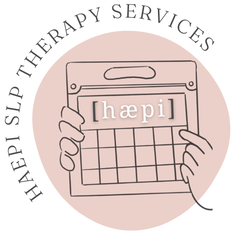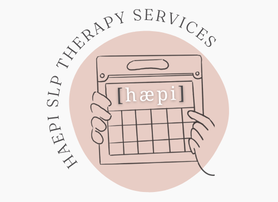FAQs about SLP & HAEPI
Do you have a physical location?
No - we come to you! The benefits of seeing children in their everyday environment (e.g., school, daycare, or home) is that we work where they are most comfortable which allows for better carryover of skills in the child's daily life, and all members of the child’s circle-of-care have the opportunity to be involved. This allows us to think outside the box for treatment sessions, such as working on speech sounds at the park, or using an AAC device to order ice cream in the summer!
What can i expect during SLP sessions?
We arrive with all the materials we need for the session, however are happy to incorporate other toys or activities that you have at home or school into the session. Since treatment sessions are primarily play-based, we will often work on the floor or at a table - however the child works best. And you can expect some silliness too - since children learn best through play! We will leave you with some ideas to continue working towards goals in between sessions.
How frequently do sessions take place?
We can decide on a treatment frequency that works best for you! For clients receiving active treatment, we typically recommend biweekly sessions as it allows for time to try strategies between sessions. However, this will be discussed on an individual basis, and may vary depending on caseload demands. Treatment can be paused or discontinued at any time.
What is the referral process?
Families can self-refer, with no physician referral necessary. Please reach out via the contact page or via phone or email, and we will get you started with the referral process.
What is your schedule ?
Each of our providers has their own availability. Currently, Halle is seeing clients through HAEPI SLP THERAPY SERVICES on Fridays & Sundays, as well as some weekday evenings. Reach out to get started!
What methods of payment do you accept?
We ask that a credit card be placed on file during booking for contactless payment, however we will also accept e-transfer if needed. Upon receipt of payment, a receipt will be provided to you that you may submit for reimbursement through extended healthcare benefits or Ontario Autism Program (OAP) funding. Please refer to our Fees and Funding page for more information.
FAQs about AAC
Does AAC contribute to speech/language delay?
Not only does AAC *not* pose a barrier to language development in any way, there's actually evidence that AAC can *help* speech to develop! First, providing a way for kids to communicate without as much frustration will show them that they have the potential to be successful communicators, which makes them more likely to keep trying to use language. This means that AAC can actually empower children to continue learning—NOT prevent it from happening. Also, speech-generating devices can provide useful audio output for children to copy, which can directly help a child’s speech skills develop.
Shouldn't I just focus on requesting? Why does my child need aac?
‘Requesting’ is a very common strategy and goal used in speech therapy, but there’s a lot more to language than just that! We believe that kids of all abilities should be exposed to and taught how to use all sorts of different functions of communication, from telling stories and answering questions to saying no and arguing! This of course includes AAC users.
Do i need to work on my child's understanding prior to introducing aac?
Remember that AAC stands for Alternative & Augmentative Communication — it *is* communication in its own right. A child who uses speech would struggle to understand language if speech was not modelled for them, so of course the same would be true for a child that learns using AAC. In other words, it is the use of (and observing the use of) AAC that will facilitate and contribute to the AAC user’s understanding of language.
How will i know if/when my child is ready for aac?
Actually, there’s no such thing as not being ready to use AAC. Just like how babies don’t need to qualify as ready before learning how to speak verbally, there is no right or wrong time to introduce children to the methods of communication that will allow them to learn. They're ready!
FAQs about Gestalt Language Processing
What is a gestalt?
Gestalts (or "scripts") are the repetition of words or phrases heard that are used verbatim after some time has passed. A gestalt may be used after the child has heard it from its original source hours, days, weeks, or even years later. It is a "chunk" of language stored in a child's memory for later use. It is often tied to an emotional experience for the child, and each gestalt carries a unique meaning to the child.
HOW DOES MY CHILD MOVE FROM GESTALTS TO SELF-GENERATED LANGUAGE?
GLPs follow the stages of Natural Language Acquisition (NLA) to move from echolalia to self-generated (unique and flexible) language. Some GLPs will move through the stages completely independently, but some Autistic GLPs may need extra support moving through the stages. See below for a very brief overview of NLA Stages 1-4:
- Stage 1 - ECHOLALIA: Scripting gestalts or intonation patterns exactly as they were once heard (delayed echolalia)
- Stage 2 - MITIGATION: Mix-and-matching parts of gestalts
- Stage 3 - SINGLE WORD & 2-WORD COMBINATIONS: Isolating single words and beginning to combine referentially with other single words
- Stage 4 - ORIGINAL PHRASES & BEGINNING GRAMMAR: Combining single words to make new, self-generated sentences that use both nouns and verbs (beginning grammar)
What if my child's gestalts are unintelligible?
Because gestalt language processors (GLP) are "intonation babies," they often hear a stream of sound and listen for the breaks in our utterances, songs, and lines from movies. Remember, gestalts are one whole unit for a GLP. A gestalt is not made up of individual words for them, but rather it is one "chunk." The intonational pattern of the gestalt is often what matters most to the GLP, and may sound like gibberish to the untrained ear. We often have to do some "detective work" to figure out where a gestalt originates from and what it means to the child!
How should I speak to my GLP?
Just speak naturally! Understand that echolalia is meaningful, and a GLP is communicating with it. GLPs in the early stages of acquiring language will benefit more from the use of 'declarative language' rather than responding to questions. Comment on the world around you without setting expectations for a certain answer. GLPs progress in a different way and pace than ALPs, so understand that their path to flexible, self-generated language is not wrong - it's just different!
Will my child always be a GLP?
Yes! A child who is a GLP will always be a GLP - but as they move through the stages, their language will remain flexible. Just because someone is a GLP does not mean they will always use echolalia. We also know from Autistic adults that in moments when there are more sensory or emotional demands, GLPs may prefer to use gestalts to communicate.
FAQs about Music-Directed Speech Therapy
Does my child need to have musical ability to benefit from Music-Directed Speech Therapy?
Not at all! This treatment modality is NOT about music instruction, but about utilizing principles from music therapy to enhance speech therapy outcomes. It is not necessary for your child to be musically gifted in any way!
What would a music-directed speech therapy session look like?
Since music therapy concepts can benefit a wide variety of individuals with many different types of needs, there is no one-size-fits-all session. Each child's needs, interests, and environments will be taken into consideration when developing a customized music-directed speech therapy treatment plan.
Would these sessions still be covered by OAP or Insurance?
Yes. Music-directed speech therapy services are still offered as speech therapy services! Kaelyn is a registered music therapist, but she provides services through HAEPI SLP Therapy Services as a Speech Language Assistant.
FAQs about Occupational Therapy
What is paediatric Occupational Therapy?
Pediatric Occupational Therapy is a specialized area of OT that focuses on helping children develop the skills they need to perform daily activities. These activities can include anything from playing and learning to self-care tasks like dressing and eating.
Who can benefit from OT?
Children who can benefit from OT include those with:
- Developmental delays
- Autism Spectrum Disorder (ASD)
- Sensory processing issues
- Fine and gross motor skill challenges
- Behavioural and emotional difficulties
- Attention Deficit Hyperactivity Disorder (ADHD)
What conditions do OTs treat?
Paediatric OTs treat a variety of conditions, such as...
- Sensory processing disorders
- Developmental delays
- Motor skill difficulties
- Learning disabilities
- Behavioural challenges
What can I expect from my child's OT sessions?
Before delving into treatment, you, the occupational therapist and in some cases, your child, will meet for an initial consultation. During the consultation, the OT will...
During a regular therapy session, you can expect...
- conduct a thorough assessment of your child's development, challenges, and strengths,
- discuss your child's daily activities and any difficulties they face, and
- begin creating a personalized treatment plan tailored to your child's needs.
During a regular therapy session, you can expect...
- a fun and engaging environment tailored to your child's interests,
- activities designed to address your child's specific goals and challenges,
- continuous assessment and feedback from the therapist, and
- an emphasis on building skills and confidence to perform daily tasks independently.
How are my child's treatment goals determined?
Treatment goals are set collaboratively, involving the OT, parents or caregivers, and when appropriate, the child. Goals are based on your child's needs, interests, and family priorities, ensuring they are realistic and achievable.
What types of interventions do OTs use?
Paediatric OT interventions can include things like...
- Play-based activities to enhance motor, cognitive, and social skills
- Sensory integration techniques to help children manage sensory processing issues
- Training in daily living skills (e.g., dressing, feeding)
- Use of adaptive tools and strategies to support independence
- Parent and caregiver education to support therapy at home
How long does Occupational Therapy usually take?
The duration of therapy varies based on your child's specific needs and goals. Some children may benefit from short-term intervention, while others may require longer-term support. Progress is regularly reviewed, and therapy plans are adjusted as needed.
How can I get started with Paediatric Occupational Therapy at HAEPI SLP?
Getting started is simple! Contact us via phone or email to schedule an initial consultation. We look forward to supporting your child on their path to improved well-being and independence.
FAQs about SLP Check-ins for Baby
What can the SLP assess?
- Receptive Language: Understanding and processing what is heard.
- Expressive Language: How your child uses words and sentences.
- Pre-Linguistic Skills: Early skills like babbling, gesturing, and eye contact.
- Play/Social Skills: Interaction with others and engagement in play.
How do I know if my baby needs an SLP check-in?
If you want to make sure your child's language development stays on track, have concerns about your child's language development, or worry if they are not meeting certain milestones, an SLP check-in can provide clarity and guidance.
What happens during a check-in session?
During a check-in, the SLP will interact with your baby through play and structured activities, assess various language skills, and discuss findings and recommendations with you.
How often should my baby have an SLP check-in?
This varies based on your child's needs. Some families may benefit from monthly check-ins, while others may prefer less frequent visits.
Will I receive activities to do at home?
Yes! The SLP will provide you with tailored strategies and activities to support your baby's development between sessions.
Can I attend the sessions with my baby?
Absolutely! Parent and caregiver involvement is crucial, and we encourage you to participate actively in the sessions.
Don't see your question?
Empowering Happy Communicators |
get in touch |
Quick Links |
© HAEPI SLP THERAPY SERVICES.
HAEPI SLP Therapy Services is proudly neurodiverse, Indigenous-owned, and woman-operated.
We acknowledge that the City of Thunder Bay has been built on the traditional territory of Fort William First Nation, signatory to the Robinson Superior Treaty of 1850. We also recognize the contributions made to our community by the Métis people. We strive as guests on these lands to honour our responsibilities to care for this land and uphold the Treaties that were signed therein.



